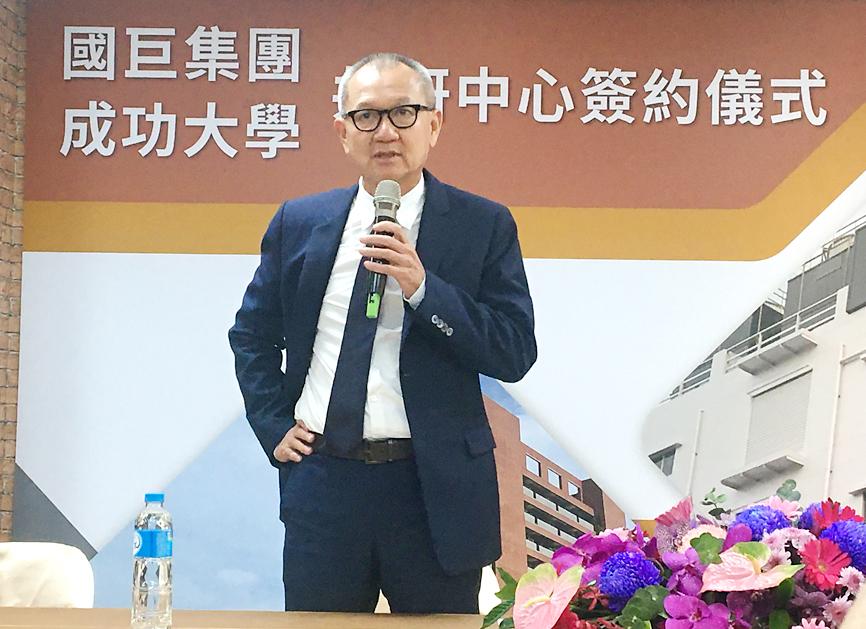Yageo Corp (國巨), the nation’s largest passive components supplier, on Saturday broke ground for a new plant in Kaohsiung that is expected to begin commercial production in 2022.
Yageo chairman Pierre Chen (陳泰銘) told the groundbreaking ceremony that it would be the company’s first new plant in the city in 15 years as it embarks on a plan to move its high-end technology production back home from overseas.
The plant, which is expected to be completed in August 2022, would produce passive components, such as chip resistors, inductors and multi-layer ceramic capacitors (MLCCs), starting in October that year, Yageo said.

Photo: CNA
The plant is being built at a cost of NT$5 billion (US$173.33 million), with an additional NT$13 billion to NT$15 billion allocated for equipment to produce advanced MLCCs, and is expected to create 3,000 new jobs, the company said.
The facility would have 10 stories with a floor area of 85,800m2, about 1.3 times the size of Yageo’s two other MLCC factories in Kaohsiung.
When the plant starts operation, 60 percent of Yageo’s total MLCC production would be in Taiwan, Chen said.
The production lines in Taiwan are to manufacture specialty and high-end MLCCs for use in the fields of automotive electronics, medical care, aviation, 5G and the Internet of Things, among others, he said.
With three plants in operation in Taiwan, Yageo’s MLCC production capacity would increase from 60 billion to 100 billion units per month, cementing its position as a leading global MLCC supplier, Chen said.
Yageo would also boost its development of high-technology through expansion, he said, citing the company’s acquisition earlier this year of US companies Kemet Corp and Pulse Electronics Corp for US$1.64 billion and US$740 million respectively.
Yageo would continue to invest in Kaohsiung as part of its plan to make Taiwan its manufacturing hub over the next five years, Chen said.
The company said it has teamed up with National Cheng Kung University in Tainan to establish a research and development center, where it would set up an academy to foster talent for the development of passive components.
Yageo has invested at least NT$50 million in the center, which has two research compounds, one in Kaohsiung and the other at the university.
Yageo is the largest maker of chip resistors and tantalum capacitors, but only 25 percent of its employees are in Taiwan, while 50 percent of its overseas workers are in China.

South Korea’s equity benchmark yesterday crossed a new milestone just a month after surpassing the once-unthinkable 5,000 mark as surging global memory demand powers the country’s biggest chipmakers. The KOSPI advanced as much as 2.6 percent to a record 6,123, with Samsung Electronics Co and SK Hynix Inc each gaining more than 2 percent. With the benchmark now up 45 percent this year, South Korea’s stock market capitalization has also moved past France’s, following last month’s overtaking of Germany’s. Long overlooked by foreign funds, despite being undervalued, South Korean stocks have now emerged as clear winners in the global market. The so-called “artificial intelligence

NEW IDENTITY: Known for its software, India has expanded into hardware, with its semiconductor industry growing from US$38bn in 2023 to US$45bn to US$50bn India on Saturday inaugurated its first semiconductor assembly and test facility, a milestone in the government’s push to reduce dependence on foreign chipmakers and stake a claim in a sector dominated by China. Indian Prime Minister Narendra Modi opened US firm Micron Technology Inc’s semiconductor assembly, test and packaging unit in his home state of Gujarat, hailing the “dawn of a new era” for India’s technology ambitions. “When young Indians look back in the future, they will see this decade as the turning point in our tech future,” Modi told the event, which was broadcast on his YouTube channel. The plant would convert

‘SEISMIC SHIFT’: The researcher forecast there would be about 1.1 billion mobile shipments this year, down from 1.26 billion the prior year and erasing years of gains The global smartphone market is expected to contract 12.9 percent this year due to the unprecedented memorychip shortage, marking “a crisis like no other,” researcher International Data Corp (IDC) said. The new forecast, a dramatic revision down from earlier estimates, gives the latest accounting of the ongoing memory crunch that is affecting every corner of the electronics industry. The demand for advanced memory to power artificial intelligence (AI) tasks has drained global supply until well into next year and jeopardizes the business model of many smartphone makers. IDC forecast about 1.1 billion mobile shipments this year, down from 1.26 billion the prior

People stand in a Pokemon store in Tokyo on Thursday. One of the world highest-grossing franchises is celebrated its 30th anniversary yesterday.